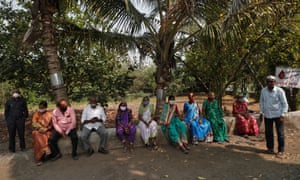Meanwhile in Australia, a devoted and joyous community has finally return to a favourite weekly ritual – singing “all the shanty bangers” at a Sydney bar:
01:29
Biden says up to 90% of adults will be eligible for Covid vaccine by 19 April
Up to 90% of US adults will be eligible for a Covid-19 shot by 19 April, Joe Biden said on Monday as he announced a major expansion of the nation’s vaccination program.
Hours after Rochelle Walensky, director of the Centers for Disease Control and Prevention (CDC) warned of “impending doom” in the race against the resurgence of infections, the US president delivered the counter measure.
Talking from the White House after a briefing from his coronavirus team, Biden promised that 90% of US residents would be living within five miles of a vaccination site within three weeks.
“We’re going to send more aid to states to expand the opening of more community vaccination sites, more vaccines, more sites, more vaccinators, all designed to speed our critical work,” he said.
But, chiming with Walensky, he also warned: “We still are in a war with this deadly virus, and we’re bolstering our defense, but this war is far from won.”
Biden said the vaccination figures – 75% of Americans over 65 inoculated in his first 10 weeks in office, and the new target of 200m shots in his first 100 days – gave him optimism.
But he said the country was in danger of giving back “hard fought gains” if it let up on preventative measures such as mask wearing and social distancing.
01:06
New Covid vaccines needed globally within a year, say scientists
The planet could have a year or less before first-generation Covid-19 vaccines are ineffective and modified formulations are needed, according to a survey of epidemiologists, virologists and infectious disease specialists.
Scientists have long stressed that a global vaccination effort is needed to satisfactorily neutralise the threat of Covid-19. This is due to the threat of variations of the virus – some more transmissible, deadly and less susceptible to vaccines – that are emerging and percolating.
The grim forecast of a year or less comes from two-thirds of respondents, according to the People’s Vaccine Alliance, a coalition of organisations including Amnesty International, Oxfam, and UNAIDS, who carried out the survey of 77 scientists from 28 countries. Nearly one-third of the respondents indicated that the time-frame was likely nine months or less.
Persistent low vaccine coverage in many countries would make it more likely for vaccine-resistant mutations to appear, said 88% of the respondents, who work across illustrious institutions such as Johns Hopkins, Yale, Imperial College, London School of Hygiene & Tropical Medicine and the University of Edinburgh:
This content first appear on the guardian

